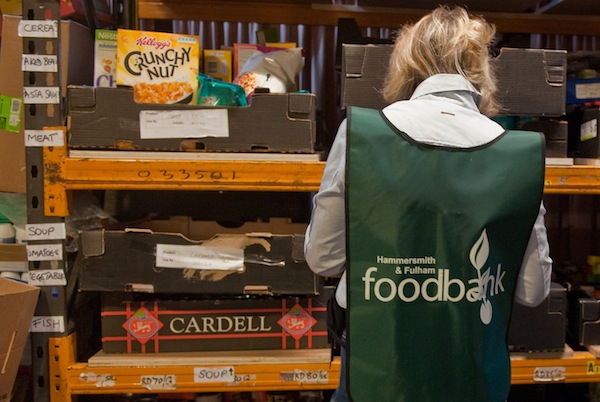Are food banks a scandal? For this week’s Spectator, I visited the Salisbury food bank, set up in 2000, to find out what causes families to turn to these charities. I must admit that when I arrived at the headquarters of the Trussell Trust, which runs many of the food banks in this country, I was expecting to meet more angry people, spitting fire about the cruel government. Instead I interviewed Chris Mould, the Trust’s chief executive, who was so unremittingly positive about the work that food banks do that I ended up writing a rather different piece than the one I set out to do.
True, Mould was unimpressed with some of the government’s benefit cuts, which he worries will have unintended and costly consequences. But most of all, he was keen to impress upon me that food banks are not a scandal. In fact, the real scandal is that they haven’t existed for longer in this country. And the problems they address are so varied and complex that even when the good times roll again, we will still need food banks because government is incapable of solving every problem. It creates a fair few problems itself through inefficiency.
That doesn’t let politicians off the hook, by the way. There are some benefit policies that are badly-designed, even though welfare reform is desperately important. But more than that: successive governments have failed to focus on reforms that will help people live lives independent of the state. I wrote about this after Margaret Thatcher’s death, when everyone was mulling anew her comments on society and government. But it is reductive and wrong to argue that it is simply the Coalition’s fault that people need food parcels.
The political point worth noting is that the Tories have made a real mess of trying to respond to the growth of food banks. When Labour MPs first started asking questions about them in the Chamber, David Cameron tried to brush them away with a reference to the Big Society. That wasn’t enough. The questions kept coming.
By the time that someone in Downing Street had remembered that it is thanks to the Coalition that JobCentres can give out vouchers to claimants whose benefits are delayed, it was too late. Labour had dominated the narrative and food banks were a scandal. Many of the things that drive people to food banks are scandals: it is a scandal, for instance, that the biggest reason for this kind of hunger is benefit delay (as opposed to benefit cuts). But the banks themselves are an example of society doing a job that government could never do, and saving a great deal of grief and money further down the line. Cameron never made that case: he was initially too embarrassed, and now he tries to brush away criticism by reminding Labour of how many food banks were already open when they were in government. For its part, Labour has had to work out what it really thinks about these charities beneath the PMQs bluster. Policy chief Jon Cruddas told Newsnight in February that he thought they were a good thing and here to stay: perhaps the rest of the party will come around to this way of thinking eventually too.
This isn’t an isolated example of the government failing to see a big problem coming down the line. The underoccupancy cut for social housing benefit claimants – the ‘bedroom tax’ or ‘spare room subsidy’, depending on which partisan planet you occupy – was announced in the 2010 emergency budget. Yet ministers never gave it a name more catchy than ‘housing benefit: size criteria for people renting in the social rented sector’, and left the door open for Labour to frame the cut as they wished.
Downing Street clearly has two problems. The first is that it often fails to see rows coming, even when they’re heading towards it down a straight track, kicking up a great deal of dust as they approach. This means it doesn’t work out how it will respond to a social phenomenon, even when at the bottom of things, it’s not as bad as the government’s critics like to make out. The second is that it doesn’t always bother to frame a policy in a way that voters will appreciate. Don’t wait for Labour to give a cut a name and make it unpopular: set out with a name that the Opposition has to hack away at. The most successful example of this is the benefit cap, which has a name that is easy to understand, and difficult to undermine. It is one of the most popular policies pollsters have ever encountered, and it’s easy to see why. But this sort of thinking is all too rare. If the government wants to avoid messing up on the next big social phenomenon, it should learn from its experience with food banks.
P.S. The Trussell Trust is a fantastic charity. Its team was kind enough to organise a day in Salisbury watching the charity at work and meeting food bank clients. I wish more people were as optimistic about the power of community as Chris Mould. And he also gave me one of my favourite food bank facts: they have never asked for donations of baked beans, yet have an entire room in their warehouse full of them.







Comments